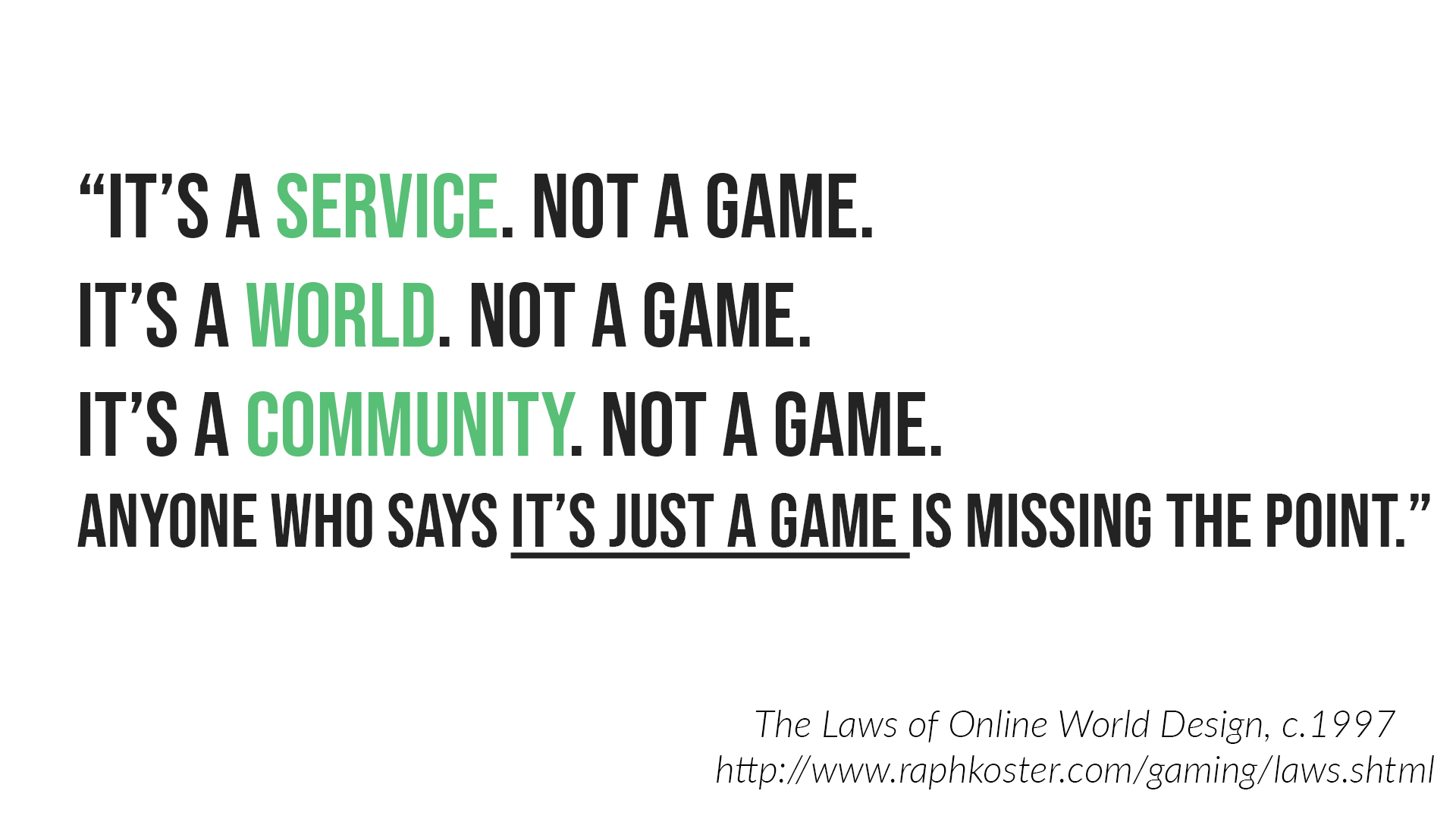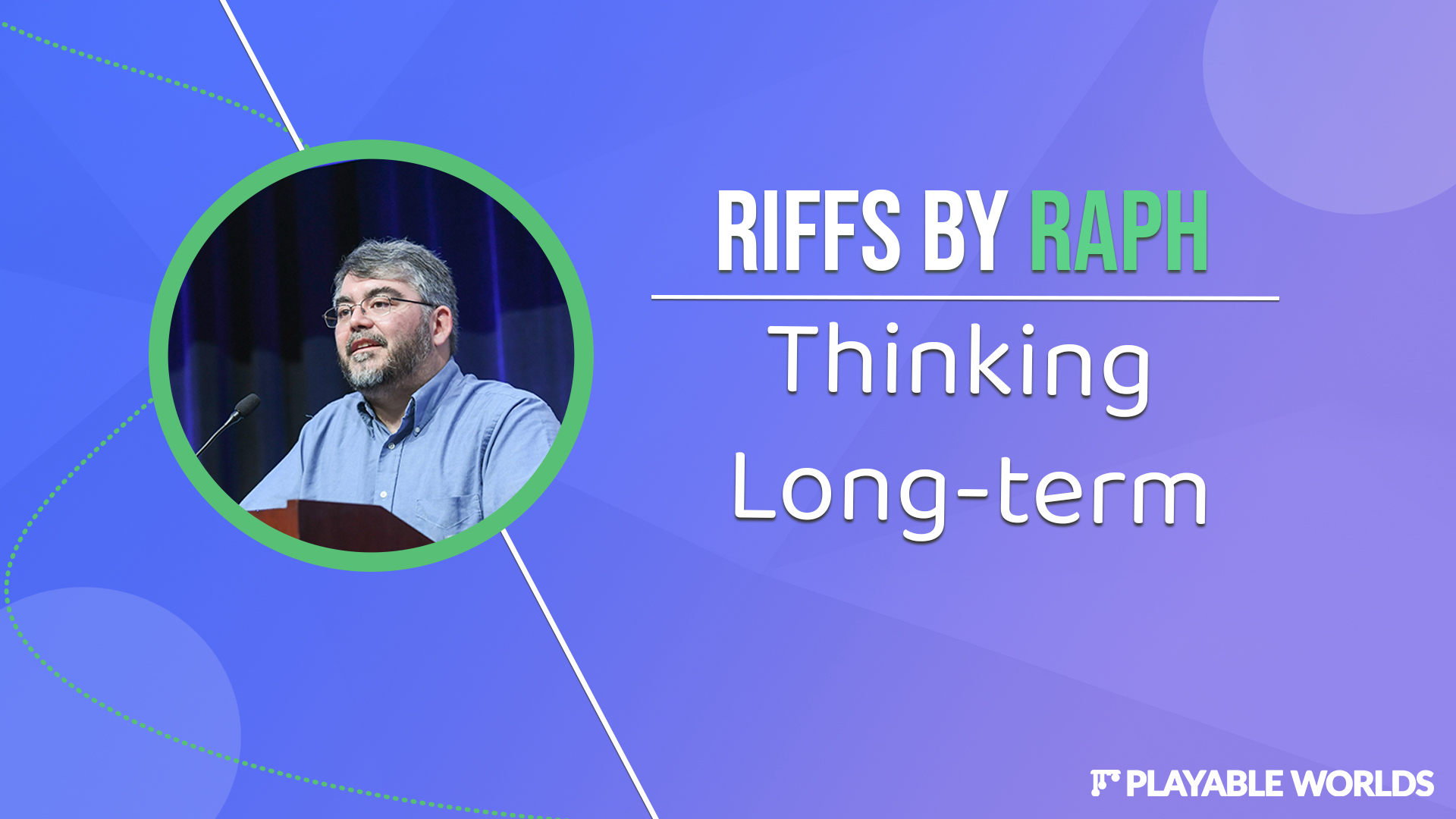Businesspeople like to talk about terms like “engagement” and “retention.”
The first of these means “how involving do players feel your game is?” They tend to measure it based on length of play sessions, or frequency of play sessions.
The second one means “how long do players stick with your game?” Like, do you play it for a few days and then drop it? Or do you keep playing it and make it a part of your life, a hobby that persists maybe for years?
Of course, players don’t like to think of things this way. They would much rather ask the question “is this game fun?” And that topic happens to be something that I have thought about a lot – I even wrote a book about it.
The reason why businesspeople need to use other words is because “fun” isn’t particularly measurable.
For one thing, it’s really different for different people. Some people find fun in raising cute pets, and others in turning them into giblets and loot. Some enjoy building, and others tearing down.
There isn’t anything wrong with that! A person’s taste in fun will evolve over time, by quite a lot. When we were little kids, we all liked games that seem trivial or random to us now; one of the biggest characteristics of fun is that we outgrow it.
This is because a huge amount of fun is driven by learning patterns. Not necessarily optimizing or mastering them – that’s a common misconception. You might find a platformer fun, but it doesn’t mean you are spending all your time doing speed runs. We tend to work on patterns only as long as we find something worthwhile to keep digging into, and frankly, usually we decide we have gotten enough out of a game long before we master it to the degree that a pro esports player might.
We’ve talked quite a lot about making a game that welcomes diverse play styles. We have talked about how it makes for better, stronger communities. We have talked about how it unlocks a ton of gameplay around the economy.
But there’s a pretty mundane reason to support more ways to play. Players get bored. It’s natural. It is really rare that a single game holds someone forever. And if you don’t have something else for them to do as a change of pace, well, you’re likely to lose them.
Supporting a range of ways to play means that when someone gets bored of one activity, they can do something else, which is the most human thing in the world. What is weird is the idea that someone would spend all their time doing only one thing to the exclusion of all else — even if they love it!
Most games try to address this by “adding content.” Content is actually a sneaky word. What it usually means is “statistical variation.” Kill an orc. Then a bigger orc. Use a fireball. No, a bigger fireball. No, a fire storm! Whoohoo! Numbers get bigger, the foozle’s name changes, and yeah, maybe you have to learn a new trick or two to surmount a challenge.
But the ruleset isn’t really any different. As designers, we make sure to build in more rewards and pats on the head for you as you keep running variations on a theme. And it’s engaging, sure. You are retained until you figure out that you’re actually on a treadmill of repetitive activities. So we keep finding new skins to put on the same bones, so that it feels fresh.
There’s nothing wrong with climbing a ladder, of course. And in a roleplaying game, you do want there to be a sense of progression. It’s just that going straight up is not the only choice. A meandering path through a park is usually a lot more fun than the most efficient path across it.
That’s why we are interested in not only providing many ways to play, but also in letting players move between them pretty freely. If you get bored of one, you can do something else that day. This doesn’t mean that there isn’t advancement within the different ways to play – we’re planning for each of them to have their own skill tree of advancement, allowing you to specialize, but also dabble. If you want to visit the carnival and spend all day at the ring toss tackling tougher and tougher challenges, great! But you know, the shooting gallery is also available, and so is the funnel cake. Mmmm, funnel cake.
Of course, we have to run a business too, or else the game will go away. So in that sense, we’re businesspeople, and we do have to care about retention. But the answer to that is fundamentally simple: you have to provide value for money. If you want subscriptions, you need to make a game that deserves to be subscribed to. You need to prove your value to the player every month.
A variety of content or ways to play is not the only marker of value. Fun is often fleeting, after all. There are more reasons why a player might stick around.

The first virtual world I worked on was LegendMUD. It is still running after a quarter-century. My second was Ultima Online. When I go to a UO player gathering, I see three whole generations of families who have played that game for 23 years now: grandparents, parents, and kids. Why?
Because running a game like this, a world like this, a service like this – this is a long-term emotional relationship with the player. No long-term relationship is fun every moment of every day. There are difficult times and dull times and exciting times, but we stick together for reasons beyond fleeting fun: mutual commitment, a feeling of trust, the investment that comes from having built something together.
One of the saddest things about the way the game industry has gone is the level of distrust and cynicism that has grown among players. And I certainly won’t pretend that the years of accumulated disappointment can be wiped away with a few blog posts from a new studio with no game to show yet. You have heard plenty of lofty promises before.
But I am still going to say this anyway:
We need to earn your trust.
We need to prove our value to you each day and each month.
We need to treat you as an ongoing valued relationship, and our game and our service must be designed to maintain and nurture that relationship.
And that will require transparency, and honesty, and openness. It will require admitting when we screw up. It will require us to see ourselves not as above the community, but as part of it. That is our commitment to you.
As far as I am concerned, as we build these playable worlds, we are building something together.


